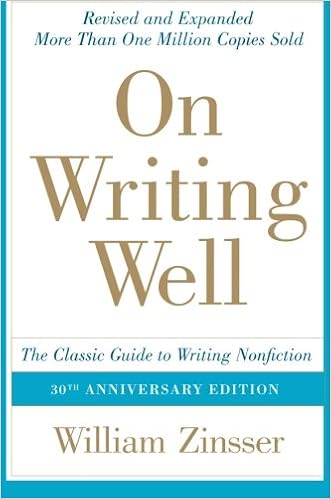Book Summary - On Writing Well
Book Summary - On Writing Well: The Classic Guide to Writing Nonfiction by William Zinsser
I read On Writing Well and you won’t believe what happened next.
Just kidding, this is not a book advocating clickbait titles or the dark side of advertising. It ‘s a genuine book first published in 1971 with many tips and examples on how to become a better writer. Here are some notes I took.
Notes:
- Write as simple as possible. Avoid unnecessary adjectives and unclear passive constructions, replace long words with short ones
- You have to strip your writing down before you can build it back up.
- Don’t write with an audience in mind. Be yourself and write for yourself.
- Believe in your own identity and your own opinions. Writing is an act of ego, and you might as well admit it.
- On the other side, writing is learned by imitation. Don’t be afraid of reading and copying great writers when you first start out: Never hesitate to imitate another writer. Imitation is part of the creative process for anyone learning an art or a craft. Don’t worry that by imitating them you’ll lose
your own voice and your own identity. Soon enough you will shed those skins and become who you are supposed to become.
- The only way to learn to write is to force yourself to produce a certain number of words on a regular basis.
- Decide and stick to as who you are going to write (first person, third person, observer), which tense, your tone/style, the point you want to make
- Every successful piece of nonfiction should leave the reader with one provocative thought that he or she didn’t have before
- Your first paragraph needs to hook the reader into reading more
- Your ending is equally important. Don’t introduce it with boring phrases like “All in all”, “In sum it can be noted that”. If you have presented all the facts and made the point you want to make, look for the nearest exit. The perfect ending should take your readers slightly by surprise and yet seem exactly right. Quotes often make a good ending.
- Keep your paragraphs short
- The he or she problem: Use plural, general nouns, or address reader directly with “you”
- Don’t be afraid to rewrite your text. Rewriting is the essence of writing well.
- Don’t annoy your readers by over-explaining - by telling them something they already know. Try not to use words like “surprisingly,” “predictably” and “of course,” which put a value on a fact before the reader encounters the fact. Trust your material.
- Don’t alter your voice to fit your subject.
- Write with a certain nonchalance, don’t write too casual, but still use proper English
- Be wary of using clichés.
- Your emotional state will influence the way you write. It’s easiest to write about things you enjoy
- Don’t use the same overused sentences as everyone else. Try making up new vivid metaphors or use suitable quotes.
Writing about Science and Technology:
- Assume the reader knows nothing
- Nowhere else must you work so hard to write sentences that form a linear sequence. This is no place for fanciful leaps or implied truths. Fact and deduction are the ruling family.
- There is truth to the “If you want to master something, teach it to other people.”: It forces you to make sure you know how it works. Then it
forces you to take the reader through the same sequence of ideas and deductions that made the process clear to you.
- Another way to help your readers understand unfamiliar facts is to relate them to sights they are familiar with. Reduce the abstract principle to an image they can visualize.
Writing well means believing in your writing and believing in yourself, taking risks, daring to be different, pushing yourself to excel. You will write only as well as you make yourself write.
Personal opinion
This is a book that is hard to summarize and I recommend you read it yourself. Otherwise, you miss out on the many practical examples which give you a feeling on how to bring the above advice to paper. The book starts out nicely with a lot of examples which is incredibly helpful. Until the author talks about an interview about birds for ten pages and gets side-tracked telling anecdotes. I would have enjoyed the last chapter of the book more if he followed his own advice on not repeating yourself and getting to the point. Still, I recommend reading it and skipping the last chapter.

